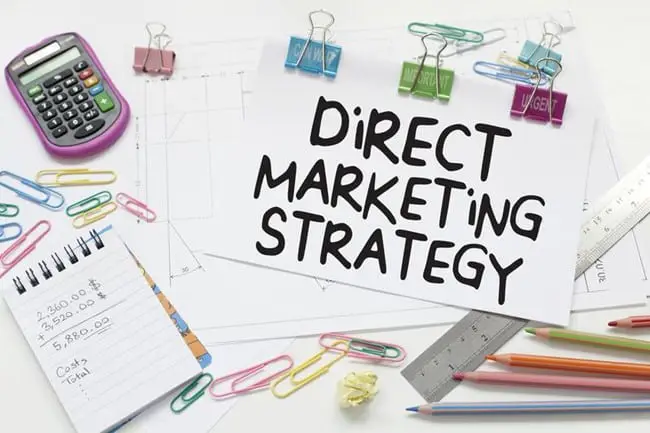Direct marketing remains a potent tool for businesses looking to communicate directly with their customers and drive immediate responses. Unlike mass marketing, direct marketing targets specific segments or individual customers, offering personalized, actionable content.

So, let’s unravel the best types of direct marketing strategies that businesses should be using, highlighting their unique benefits and practical applications, shall we?
Email Marketing
Email marketing stands as one of the most effective direct marketing strategies, offering a high return on investment (ROI). Its power lies in the ability to send personalized, targeted messages directly to the inboxes of your customers or prospects.
Whether it’s promoting a new product, sharing a newsletter, or sending a special offer, email marketing allows for a wide range of communications tailored to various segments of your audience.
To maximize the effectiveness of email marketing, it’s crucial to build a robust email list through legitimate means like sign-up forms on your website or during checkout processes. Segmenting this list based on customer behavior, preferences, or demographics enables more personalized and relevant email campaigns.
Moreover, the success of email marketing hinges on crafting compelling subject lines, engaging content, and clear calls to action (CTAs). Regular testing and optimization, based on open rates and click-through rates, can help refine your strategy for better results.
Also, ensuring your emails are mobile-friendly is essential, as a significant portion of emails are now read on mobile devices. You can take a peek at this link if you’re curious to learn more https://whattheythink.com/articles/116897-prioritizing-customer-experience-direct-marketing/.
Social Media Marketing
Social media platforms offer a direct line to a vast audience, making them an invaluable tool for direct marketing. Platforms like Facebook, Instagram, Twitter, and LinkedIn allow businesses to target users based on detailed demographic and behavioral data. This precise targeting ensures that your message reaches the most relevant audience, increasing the likelihood of engagement and conversion.
Social media marketing is not just about promoting products or services; it’s also an avenue for building relationships with your audience.
Engaging content, interactive posts, and responsive customer service can foster a sense of community and loyalty around your brand. Additionally, social media advertising can be a cost-effective way to boost your reach and visibility, with options to tailor ads based on your specific objectives and budget.
Direct Mail
Among the numerous strategies of direct marketing, we must mention this one as well. Despite the digital revolution, direct mail continues to be a powerful direct marketing tool, especially in reaching demographics less inclined towards digital media.
Tangible mail, such as brochures, catalogs, or postcards, can stand out in the era of digital overload. Personalization, creative design, and a clear CTA can significantly enhance the effectiveness of direct mail campaigns.
One of the key advantages of direct mail is its high engagement rates. People tend to spend more time reading physical mail compared to emails or online ads. Furthermore, innovative techniques like augmented reality or QR codes can bridge the gap between physical and digital marketing, offering an interactive experience to recipients.
Telemarketing
The term “telemarketing” refers to the practice of contacting current or future clients directly via telephone. Gathering feedback, conducting surveys, promoting products, or setting appointments can all be effectively done in this manner. Telephone marketing allows for instantaneous communication, which can result in quick conversions and provides an option for customized service.
But telemarketing is most effective when done in a polite and unobtrusive manner. Reputational harm can be avoided by strictly adhering to legislation and ethical norms. If you want your telemarketing efforts to be more successful, you should train your telemarketers in customer service, product expertise, and effective communication. You can also check out this page to discover more relevant info on the topic.
SMS Marketing
It’s also good to know that SMS marketing is another direct marketing strategy that offers immediacy and high open rates. Text messages are typically read within minutes of receipt, making them an excellent medium for time-sensitive offers, reminders, or alerts. Like email marketing, SMS campaigns can be personalized and segmented based on customer data, increasing their relevance and effectiveness.
The key to successful SMS marketing is brevity and clarity. With limited character space, messages need to be concise yet compelling. Including a clear CTA and ensuring compliance with opt-in regulations are also critical components of SMS marketing.
Content Marketing
This strategy is responsible for attracting and keeping a clearly defined audience by making and sharing useful, consistent, and relevant material. While not direct marketing in the traditional sense, content marketing indirectly drives customer action by providing useful information, solving problems, or entertaining the audience.
This strategy is particularly effective in building brand authority and trust. High-quality content, whether in the form of blog posts, videos, or podcasts, can establish your brand as a thought leader in your industry. It also supports other direct marketing efforts by providing shareable content that can be distributed via email, social media, or direct mail. How amazing is that?
Influencer Marketing
Influencer marketing harnesses the power of influential people on social media to market your products or services. By partnering with influencers whose followers match your target audience, you can reach a broader and more engaged audience.
If you want this strategy to succeed you need to find the right influencers whose values align with your brand and whose followers are likely to be interested in your products. Authenticity is crucial in influencer marketing; scripted or forced promotions can backfire, damaging both the influencer’s and your brand’s credibility.
Referral Marketing
The last one leverages the power of word-of-mouth by encouraging satisfied customers to refer friends or family to your business. This can be facilitated through referral programs that offer incentives for both the referrer and the referee.
Referral marketing is effective because people tend to trust recommendations from people they know. It’s a cost-effective strategy that can lead to high-quality leads, as referrals often involve customers who already have some level of interest or need for your products or services.
